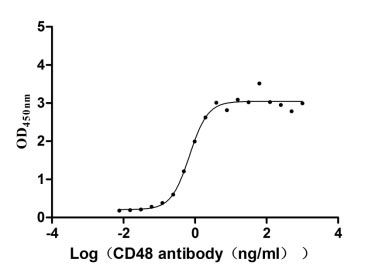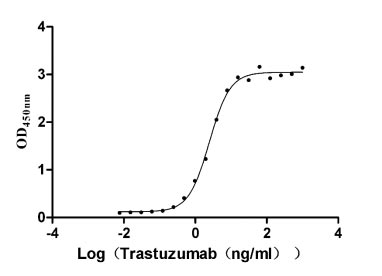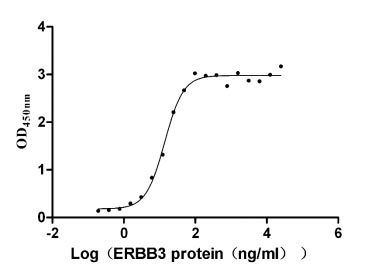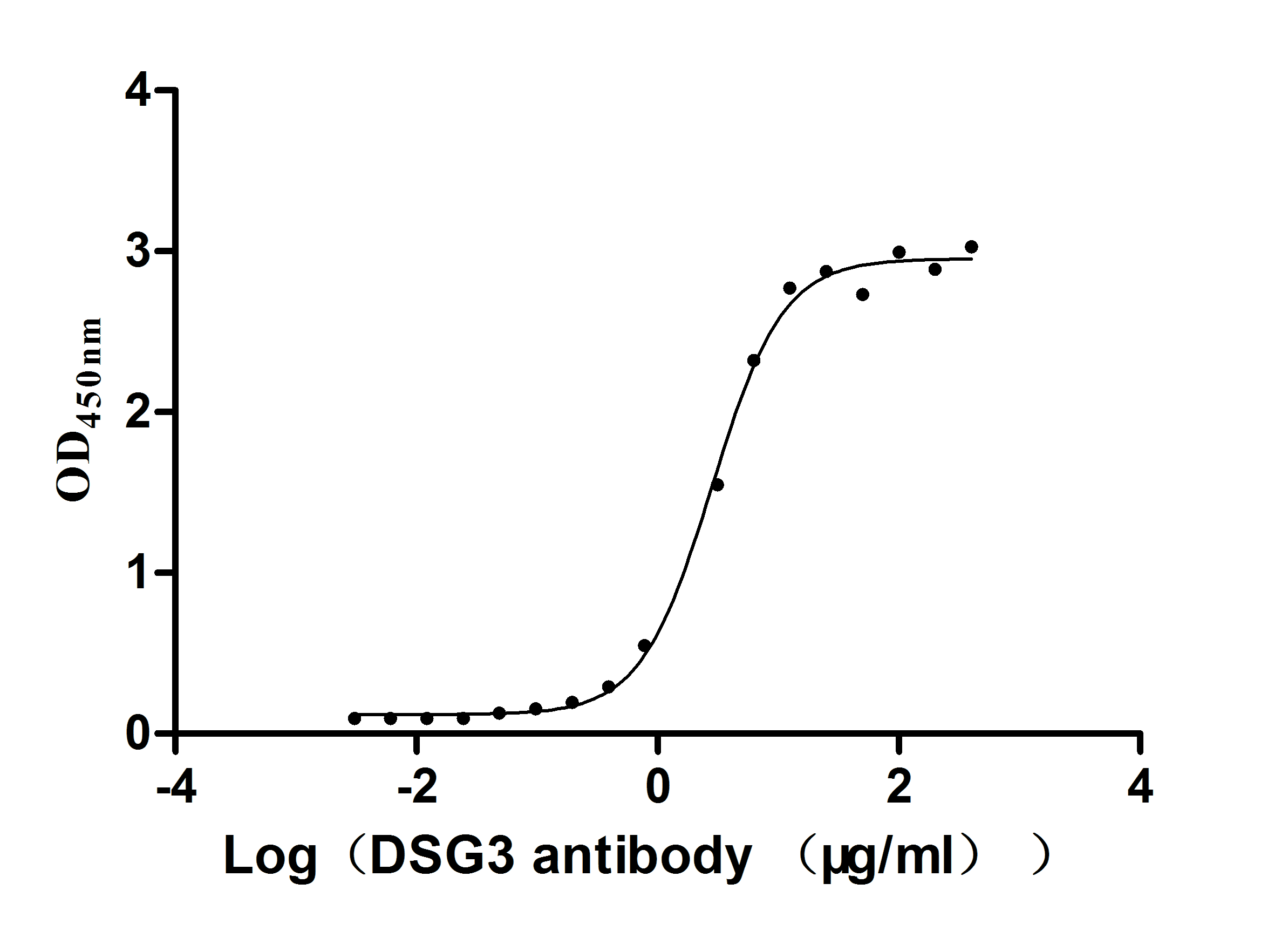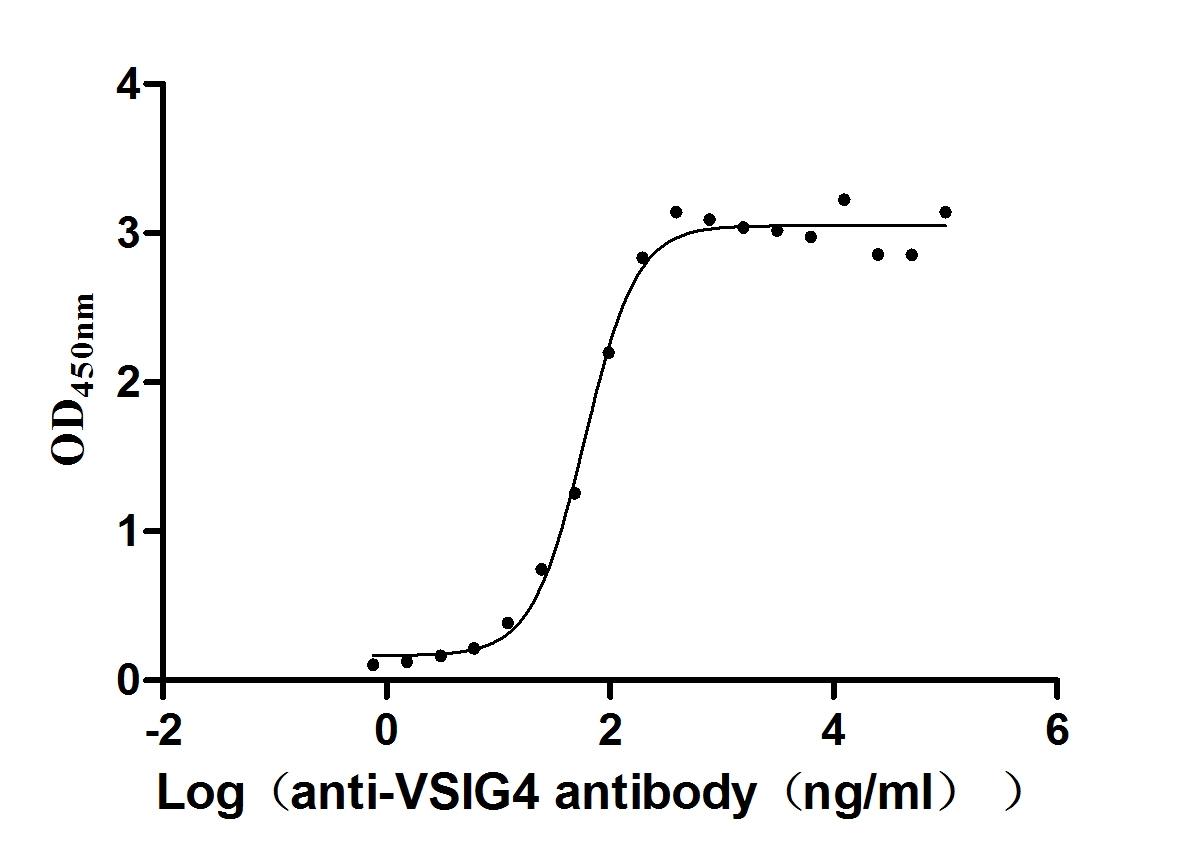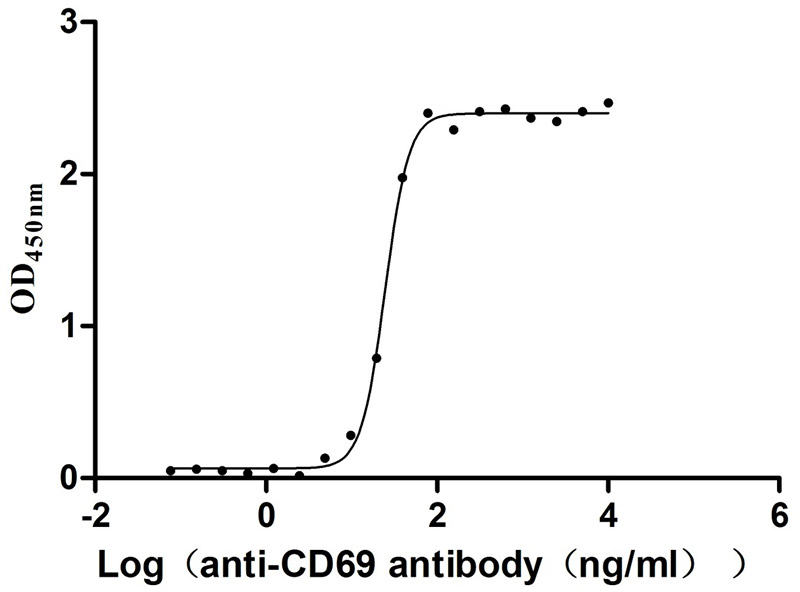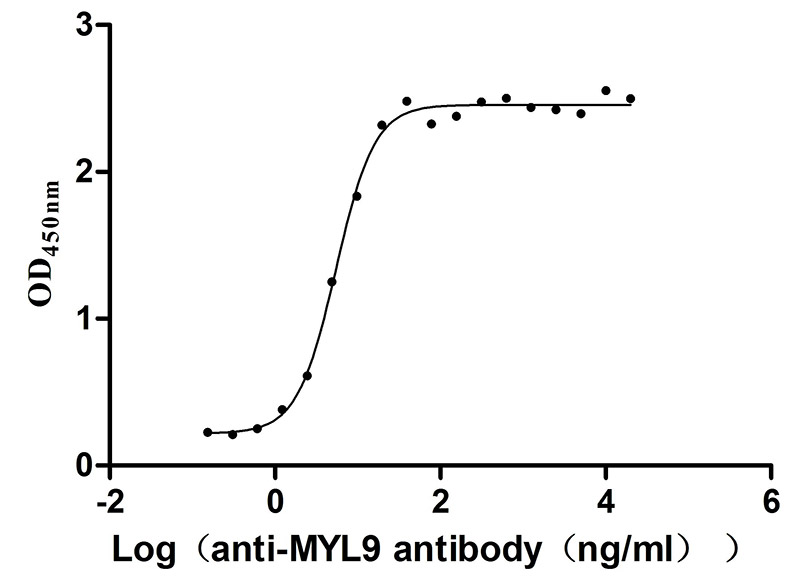Recombinant Human Ephrin-B1 (EFNB1), partial
-
货号:CSB-YP007465HU1
-
规格:
-
来源:Yeast
-
其他:
-
货号:CSB-EP007465HU1
-
规格:
-
来源:E.coli
-
其他:
-
货号:CSB-EP007465HU1-B
-
规格:
-
来源:E.coli
-
共轭:Avi-tag Biotinylated
E. coli biotin ligase (BirA) is highly specific in covalently attaching biotin to the 15 amino acid AviTag peptide. This recombinant protein was biotinylated in vivo by AviTag-BirA technology, which method is BriA catalyzes amide linkage between the biotin and the specific lysine of the AviTag.
-
其他:
-
货号:CSB-BP007465HU1
-
规格:
-
来源:Baculovirus
-
其他:
-
货号:CSB-MP007465HU1
-
规格:
-
来源:Mammalian cell
-
其他:
产品详情
-
纯度:>85% (SDS-PAGE)
-
基因名:EFNB1
-
Uniprot No.:
-
别名:EFNB1; EFL3; EPLG2; LERK2; Ephrin-B1; EFL-3; ELK ligand; ELK-L; EPH-related receptor tyrosine kinase ligand 2; LERK-2
-
种属:Homo sapiens (Human)
-
蛋白长度:Partial
-
蛋白标签:Tag type will be determined during the manufacturing process.
The tag type will be determined during production process. If you have specified tag type, please tell us and we will develop the specified tag preferentially. -
产品提供形式:Lyophilized powder
Note: We will preferentially ship the format that we have in stock, however, if you have any special requirement for the format, please remark your requirement when placing the order, we will prepare according to your demand. -
复溶:We recommend that this vial be briefly centrifuged prior to opening to bring the contents to the bottom. Please reconstitute protein in deionized sterile water to a concentration of 0.1-1.0 mg/mL.We recommend to add 5-50% of glycerol (final concentration) and aliquot for long-term storage at -20℃/-80℃. Our default final concentration of glycerol is 50%. Customers could use it as reference.
-
储存条件:Store at -20°C/-80°C upon receipt, aliquoting is necessary for mutiple use. Avoid repeated freeze-thaw cycles.
-
保质期:The shelf life is related to many factors, storage state, buffer ingredients, storage temperature and the stability of the protein itself.
Generally, the shelf life of liquid form is 6 months at -20°C/-80°C. The shelf life of lyophilized form is 12 months at -20°C/-80°C. -
货期:Delivery time may differ from different purchasing way or location, please kindly consult your local distributors for specific delivery time.Note: All of our proteins are default shipped with normal blue ice packs, if you request to ship with dry ice, please communicate with us in advance and extra fees will be charged.
-
注意事项:Repeated freezing and thawing is not recommended. Store working aliquots at 4°C for up to one week.
-
Datasheet :Please contact us to get it.
相关产品
靶点详情
-
功能:Cell surface transmembrane ligand for Eph receptors, a family of receptor tyrosine kinases which are crucial for migration, repulsion and adhesion during neuronal, vascular and epithelial development. Binding to Eph receptors residing on adjacent cells leads to contact-dependent bidirectional signaling into neighboring cells. Shows high affinity for the receptor tyrosine kinase EPHB1/ELK. Can also bind EPHB2 and EPHB3. Binds to, and induces collapse of, commissural axons/growth cones in vitro. May play a role in constraining the orientation of l...显示更多
-
基因功能参考文献:
- Lymphomas with low UTX expression express high levels of Efnb1, and cause significantly poor survival. PMID: 30006524
- Chronic hypoxia-induced slug promotes invasive behavior of prostate cancer cells by activating the expression of ephrin-B1. PMID: 30058095
- This study showed that EphB2 cells have a transient increase in migration after heterotypic activation, which underlies a shift in the EphB2-ephrinB1 border but is not required for segregation or border sharpening. PMID: 28747399
- that expression of EFNB1 and EFNB2 is implicated in Th cell differentiation and migration to inflammatory sites in both EAE and MS PMID: 27039370
- we demonstrate that mosaicism for EPHRIN-B1 expression induced by random X inactivation in heterozygous females results in robust cell segregation in human neuroepithelial cells, thus supplying experimental evidence that Eph/ephrin-mediated cell segregation is relevant to pathogenesis in human CFNS patients. PMID: 28238796
- one novel (IVS2+3G>T) and one previously reported mutation (p.Gly151Ser) in EFNB1 Both patients were de novo cases without a family history of Craniofrontonasal syndrome. PMID: 27650623
- While ephrin-B1 deficiency leads to abnormal visual pathways in mice, it leaves the human visual system, apart from deficits in binocular vision, largely normal. PMID: 26580852
- that EphrinB1 (EFNB1) co-localizes with microtubules (MTs) during all phases of the cell cycle. PMID: 25436983
- we report a family with a G151S mutation in the EFNB1 gene. The mutation was identified in two severely affected sisters and paradoxically in their clinically unaffected father. PMID: 25486017
- T cells from rheumatoid arthritis (RA) patients expressed higher EFNB1 mRNA levels, which correlated with RA symptoms and laboratory findings. Expression of EFNB1 in T cells might be a parameter for monitoring RA disease activity and treatment responses. PMID: 25779027
- Results indicate that EphrinB1 is uniquely dysregulated in medulloblastoma and promotes oncogenic responses in medulloblastoma cells, implicating ephrinB1 as a potential target PMID: 25258252
- EphB2/ephrin-B1 were invoked in dental pulp stem cells with TNF-alpha treatment via the JNK-dependent pathway, but not NF-kB, p38 MAPK or MEK signalling. PMID: 25643922
- Patients with EFNB1 mutations have a clear phenotype. This study will facilitate genetic counseling of parents and patients, and contribute to the diagnostic and screening process of patients with suspected CFNS. PMID: 24281372
- CNK1 mediates ephrinB1 signaling that promotes cell migration through RhoA and JNK activity. PMID: 24825906
- EphrinB1 expression is related to the metastasis of breast cancer and its enhanced expression confers a poor prognosis, suggesting that EphrinB1 may be a relevant therapeutic target in breast cancers. PMID: 24240587
- High EFNB1 expression is associated with squamous cell carcinomas of the head and neck. PMID: 23811940
- we report the identification of mosaic EFNB1 mutations in every individual with craniofrontonasal syndrome, confirming the suggested diagnosis and supporting the hypothesis of cellular interference in humans. PMID: 23335590
- These results indicate a novel function of Nm23-H1 to control contact inhibition of locomotion, and its negative regulation by ephrin-B1. PMID: 22718351
- Data show that EphrinB1, a PTPN13 substrate, interacts with ErbB2, and Src kinase mediates EphrinB1 phosphorylation and subsequent MAP Kinase signaling. PMID: 22279592
- X-linked cases resembling Teebi hypertelorism may have a similar mechanism to CFNS, and that cellular mosaicism for different levels of ephrin-B1 (as well as simple presence/absence) leads to craniofacial abnormalities. PMID: 21542058
- Unreported mutation in EFNB1 predicts occurrence of congenital diaphragmatic hernia, phenotypic differences between males and female. PMID: 20734337
- The impact of craniofrontonasal syndrome-causing EFNB1 mutations on ephrin-B1 function is reported. PMID: 20565770
- study reports that the expression of ephrin-B1 is controlled by a feedback loop involving posttranscriptional regulatory mechanisms PMID: 20308325
- combination of SDF-1, PTN, IGF2, and EFNB1 mimics the DA phenotype-inducing property of SDIA and was sufficient to promote differentiation of hESC to functional midbrain DA neurons PMID: 19672298
- Human platelets express EphA4 and EphB1, and the ligand, ephrinB1. Forced clustering of EphA4 or ephrinB1 led to cytoskeletal reorganization, adhesion to fibrinogen, and alpha-granule secretion. PMID: 12084815
- Expression profile of this ligand of EPHB2 in gastric cancer PMID: 12136247
- The expression of ephrin-B1 was correlated with a poorer clinical prognosis. Ephrin-B1 protein was expressed by osteosarcoma cells and blood vessels. PMID: 12209731
- Results identified a novel interaction between EphB1 with the adaptor molecule Grb7 and suggested that this interaction may play a role in the regulation of cell migration by EphB1. PMID: 12223469
- expression of Eph-B1 in plasmacytoid dendritic cells PMID: 12384430
- Ephrin B1 induces human aortic endothelial cells migration in a pathway that involves Crk adaptor protein PMID: 12475948
- conclude that ephrinB1 and B class Eph receptors provide positional cues required for the normal morphogenesis of skeletal elements PMID: 12919674
- Eph/ephrin signaling enhances the ability of platelet agonists to cause aggregation by activating Rap1 and these effects require oligomerization of ephrinB1 but not phosphotyrosine-based interactions with the ephrinB1 cytoplasmic domain. PMID: 14576067
- Ephrin-B1 may be involved in in vivo tumor progression by promoting neovascularization in hepatocellular carcinoma PMID: 14642617
- Mutations of the ephrin-B1 gene cause craniofrontonasal syndrome PMID: 15124102
- ephrin-B1 internalization is an active receptor-mediated process that utilizes the clathrin-mediated endocytic pathway PMID: 15351694
- On ephrinB1 stimulation, the small GTPases Rho and Ras are activated and Rap1 is inactivated. PMID: 15725075
- EFNB1 mutations have a role in familial and sporadic craniofrontonasal syndrome (CFNS) PMID: 15959873
- EphB/ephrin-B molecules play a role in restricting dental pulp stem cell attachment and migration to maintain Dthesse cells within their stem cell niche under steady-state conditions. PMID: 17204606
- C-terminus of ephrin-B1 regulates activation of the extracellular release of MMP-8 without requirement of de novo protein synthesis. PMID: 17567680
- Our results suggest that tyrosine phosphorylation of ephrin-B1 promotes invasion of cancer cells in vivo PMID: 17591954
- Silencing of EphB expression is associated with colorectal tumorigenesis. PMID: 17906625
- EphrinB1 may play an important role in the inflammatory states of rheumatoid arthritis, by affecting the population/function of T cells. PMID: 17942634
- EFNB1 mutant transcripts with nonsense codons are degraded by the nonsense-mediated mRNA decay pathway and lead to craniofrontonasal syndrome. PMID: 18043713
- Ephrin-B1 is likely to play an important role in the regulation of malignant T lymphocytes through the control of lipid-raft-associated signaling, adhesion, and invasive activity PMID: 18314490
- Several new EFNB1 mutations have been identified in craniofrontonasal syndrome. PMID: 18627045
收起更多
-
相关疾病:Craniofrontonasal syndrome (CFNS)
-
亚细胞定位:Cell membrane; Single-pass type I membrane protein. Membrane raft.; [Ephrin-B1 C-terminal fragment]: Cell membrane; Single-pass type I membrane protein.; [Ephrin-B1 intracellular domain]: Nucleus.
-
蛋白家族:Ephrin family
-
组织特异性:Widely expressed. Detected in both neuronal and non-neuronal tissues. Seems to have particularly strong expression in retina, sciatic nerve, heart and spinal cord.
-
数据库链接:
HGNC: 3226
OMIM: 300035
KEGG: hsa:1947
STRING: 9606.ENSP00000204961
UniGene: Hs.144700


